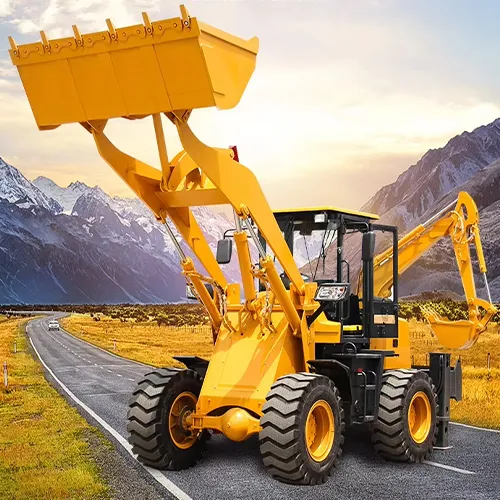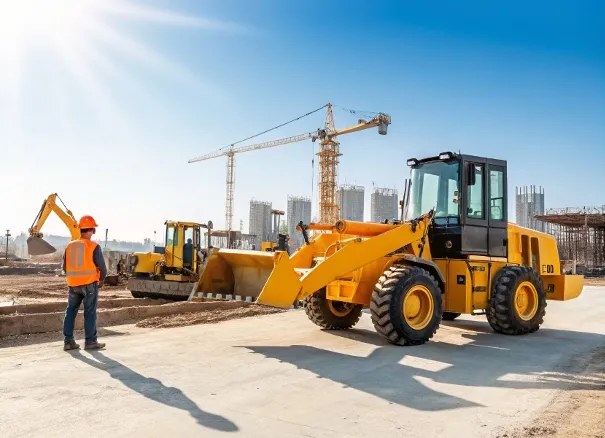Avoid your inquiry is delay response, please enter your WhatsApp/Skype along with the message, so we can contact you at the very first time.
We will reply you within 24 hours. If for urgent case, please add WhatsApp/WeChat: +86 188 0000 0000,. Or call 0086-535-2422021 directly.
*We respect your confidentiality and all information are protected. We will only use your information to respond to your inquiry and will never send unsolicited emails or promotional messages.
I have seen muddy worksites that seemed impossible to manage. I felt stuck without a machine that could dig, carry, and load all in one.
A backhoe loader is a multi-purpose construction vehicle with a front bucket for loading and a rear backhoe arm for digging. It handles excavation and loading tasks on the same platform.

I remember my first time operating a backhoe loader in a cramped urban site. I was able to dig a trench for drainage, then quickly switch to the front bucket to clear debris without swapping machines.
I had a friend who questioned whether one machine could do more than simple digging. I wanted to show how efficient a backhoe loader is when you need both digging and loading on one job.
A backhoe loader brings flexibility, moderate power, and ease of transport. It reduces equipment needs by performing digging, trenching, and loading tasks without changing machines.

I want to dive deeper into why backhoe loaders stand out in construction and landscaping. I find that they shine when space is limited or when I need to finish multiple tasks quickly. They also help me save on transport, since I can tow a smaller backhoe loader with a standard truck and trailer on many roads. That convenience cuts job delays and helps me finish tasks faster.
I have used many types of equipment. My backhoe loader always stands out when a project requires both excavation and material movement in the same day. It has a front-end loader bucket that can move soil, sand, or gravel. It can fill trucks or relocate piles around the site. Its backhoe arm can dig trenches, break up tough ground, or handle moderate excavation tasks. This dual capability is perfect for small to medium jobs. I do not need separate machines that take up extra room, especially in compact urban settings or busy event locations.
I see a backhoe loader as a “swiss army knife.” The front bucket allows me to grade and load materials. The backhoe arm lets me dig trenches for pipes, lay cables, or create foundations. This versatility saves me from moving different machines around. I switch from loading to digging in minutes. That speed boosts productivity, especially on short projects where time is tight.
A backhoe loader usually has wheels and a road-ready transmission. I can drive it between job sites if local regulations permit. Or I can load it on a standard trailer for quick transport. Large excavators or bigger wheel loaders often require special permits or specialized transport vehicles. That advantage makes a backhoe loader appealing for companies that do smaller or varied tasks, from home building to municipal repairs.
I used to worry that a backhoe loader might not have enough digging force or lifting power. Yet I found that modern models meet most mid-range demands with no problems. They can dig eight to 14 feet deep, depending on the model. They can also lift over a ton in the front bucket. That is enough for typical tasks like landscaping, trenching for water lines, or clearing debris after a storm. I have cleared small road washouts and loaded the remains onto a truck without switching machines.
I find that buying or renting one versatile machine can be cheaper than investing in both a small excavator and a separate wheel loader. Daily fuel usage stays reasonable, and maintenance focuses on one machine’s hydraulics and engine. This simplicity helps me run a lean operation when budgets are tight. I also do not need extra operators. One operator can handle a range of tasks in a single day.
When I use separate machines, I need more space to park and maneuver them. A backhoe loader does multiple tasks in one footprint. This reduces congestion on the job site, which is critical in dense areas or when working near live traffic. Fewer machines also mean fewer blind spots and less chance of collisions.
Backhoe loaders are not perfect. They lack the extreme digging force of a dedicated excavator, and they do not match the loading capacity of a large wheel loader. But for many mid-sized projects, they strike the right balance between power and adaptability. I see them on farm properties, city streets, and residential developments. They keep maintenance teams flexible. You can excavate a broken water main in the morning, then fill and compact the trench by afternoon.
I once helped a team repair sewage lines in a small city neighborhood. The narrow streets made it impossible to bring in a big excavator and a separate loader without blocking traffic. We used one backhoe loader to do all the digging and loading. That approach saved the city time, minimized lane closures, and caused less noise for residents. I realized that day how valuable a single, multipurpose machine could be.
This convenience also helps in rural areas or on farmland. If I need to dig post holes, then move a stack of fence boards, a backhoe loader fits well. I can drive it across fields, fill ruts, and shift feed or fertilizer around. The all-in-one design means I only have to maintain one engine, one set of hydraulics, and one set of tires. That is simpler than juggling multiple pieces of equipment for smaller tasks.
Some friends ask me which machine truly wins on a heavy construction site. They want to know if a backhoe loader can compete with a dedicated excavator. I always say it depends on the job.
An excavator has stronger digging power and better reach, while a backhoe loader is more versatile and easier to move between job sites. Each one excels in different conditions.

I believe the choice depends on scope, terrain, and the range of tasks a user needs to complete. Let’s explore the factors that help me pick one or the other.
I do not see it as a question of outright superiority, but rather a question of matching the right tool to the right job. When I work on large-scale earthmoving or excavation in wide-open spaces, I like the dedicated excavator for its raw digging force, continuous 360-degree rotation, and deeper reach. On the other hand, if I need a flexible machine that can both dig and load in tighter areas, I choose a backhoe loader1 to save time and reduce equipment clutter.
Excavators generally offer stronger hydraulics. Their entire frame revolves around the boom and arm, which grants them better stability. They can dig deeper trenches and handle heavier attachments like breakers or grapples more effectively. They also rotate a full circle without repositioning. Backhoe loaders typically have less digging depth, though advanced models can come close. They have to pivot the entire machine to reposition the arm from side to side.
Backhoe loaders usually drive on roads with minimal fuss. The operator can move between small job sites without needing a trailer for short distances. Excavators sometimes require specialized transport, especially if they are large or if local road laws restrict tracked vehicles. A mini or compact excavator can be towed on a trailer, but bigger excavators need permits and special rigs.
| Factor | Backhoe Loader | Excavator |
|---|---|---|
| Primary Strength | Versatility (dig + load) | Powerful digging and reach |
| Road Mobility | Good (tires, sometimes road-legal) | Needs trailer or heavy transport |
| Dig Depth/Power | Moderate to good | Generally higher, deeper |
| Rotation | Limited (swing arc) | 360° continuous |
| Typical Use | Smaller to mid-size worksites | Large earthmoving tasks |
| Cost and Maintenance | Less than big excavator | Higher if heavier machine |
Backhoe loaders have a loader bucket in front and a backhoe at the rear. I can swap out the front bucket for other attachments like forks or a sweeper. Excavators mostly work with the arm attachments—buckets, hammers, grapples, or augers. Excavators can hold bigger attachments and generate stronger forces, which helps with demolition or handling big rocks. Yet backhoe loader2s can still handle a decent variety of tasks. They just might lack the raw torque of an equivalent-sized excavator.
A large excavator needs enough room to swing freely. If space is tight, an excavator can bump into walls or other equipment. A backhoe loader has a smaller digging range, though it can navigate narrower roads. I once had to replace water lines in a busy downtown lane. An excavator would have blocked two lanes, so we chose a backhoe loader. We finished the job more quickly with fewer traffic delays.
An excavator usually costs more to buy or rent. Maintenance can also be more expensive, especially for bigger models with advanced hydraulics. Backhoe loaders often come at a lower price, making them appealing to smaller contractors or municipalities. They can handle multiple tasks with one machine. That is a big advantage for those with tight budgets.
I decide based on project scope. For large trenching or earthmoving, I lean toward an excavator. For diverse tasks like roadside repairs, utility work, or property maintenance, I pick a backhoe loader. It is a flexible partner that works for many general construction jobs. I like having both machines available, but if I had to choose one, I would think about the typical scale of my work. If I spend most of my time on small to medium projects with varied tasks, the backhoe loader might be the better investment. If I do big excavation and rarely need a loading bucket, the excavator is the king of digging.
A backhoe loader is a versatile solution for many tasks, bridging the gap between heavy excavators and smaller loaders in a single, road-friendly package.